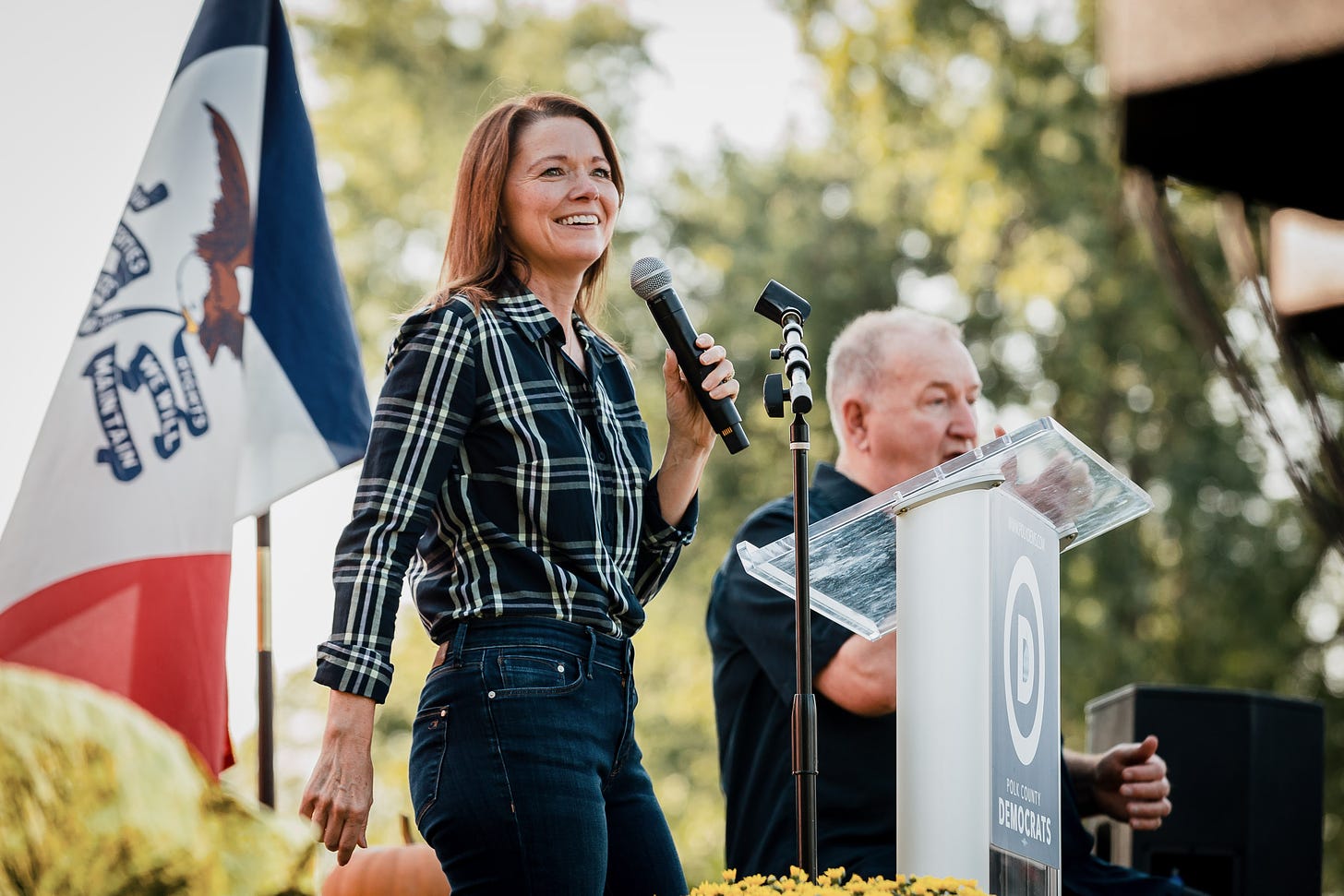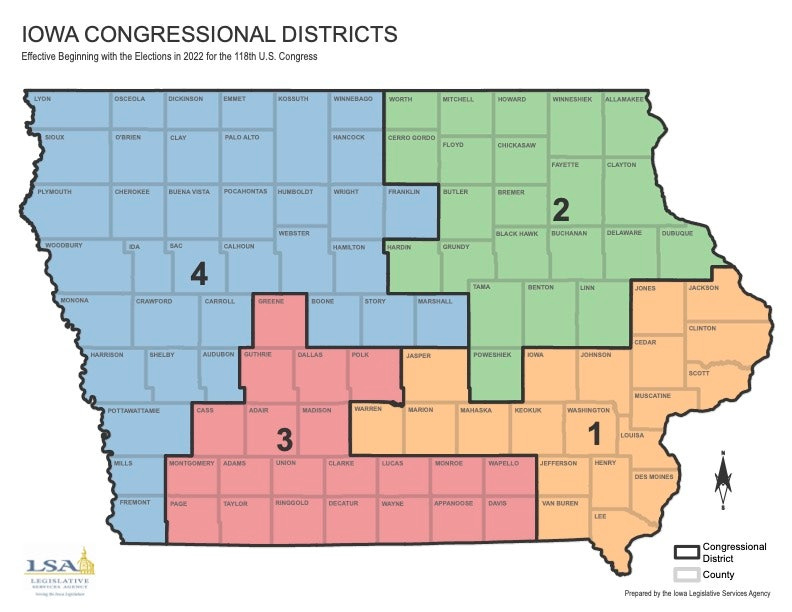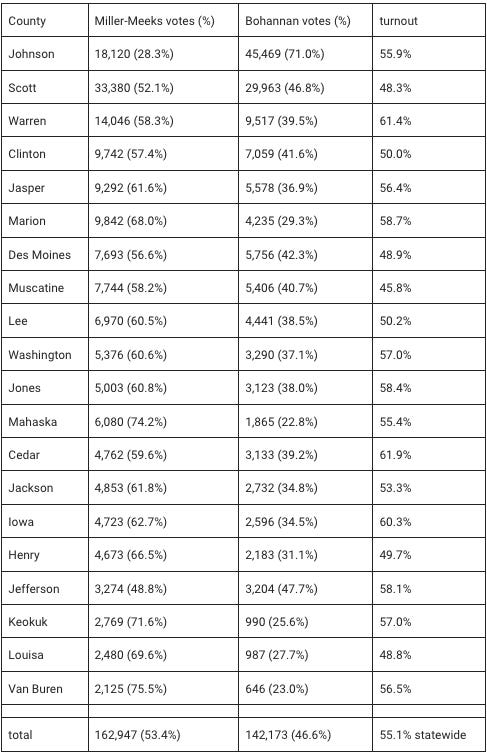What needs to happen for Christina Bohannan to beat Mariannette Miller-Meeks
First take on the IA-01 rematch

This original reporting and analysis first appeared at Bleeding Heartland and is shared here as part of the Iowa Writers Collaborative. For regular emails linking to all recent Bleeding Heartland articles and commentary, subscribe to the free Evening Heartland newsletter. Your email provider may truncate this post. In order to read the whole article without interruption, you may want to read it at this link for the best experience.
Christina Bohannan is hoping to join Neal Smith, Tom Harkin, and Berkley Bedell in the club of Iowa Democrats who were elected to Congress on their second attempt.
Challenging an incumbent is usually an uphill battle, and recent voting trends favor Republicans in southeast Iowa, where Bohannan is running against U.S. Representative Mariannette Miller-Meeks. The Cook Partisan Voting Index for Iowa's first Congressional district is R+3, meaning that in the last two presidential elections, voters living in the 20 counties that now make up IA-01 voted about three points more Republican than did the national electorate. The Daily Kos Elections team calculated that Donald Trump received about 50.5 percent of the 2020 presidential vote in this area, to 47.6 percent for Joe Biden.
The Cook Political Report and Sabato's Crystal Ball rate IA-01 as "likely Republican"—potentially competitive, but not among the top two or three dozen U.S. House battlegrounds across the country. Inside Elections recently moved this district to the more competitive "lean Republican" category.
That said, no one should write off this race. Miller-Meeks ran for Congress unsuccessfully three times and was considered the underdog against Democrat Rita Hart in 2020. Many factors contributed to the Republican's six-vote win that year, and I've been thinking about what would need to happen for Bohannan to prevail in next year's IA-01 rematch.
A quick reminder: Iowa's first district is the orange area on this map.
1. The winner will need about 190,000 votes in the general election.
It's way too early to forecast turnout for November 2024, but we can make some educated guesses.
One thing's for sure: many more voters will participate than in 2022, when Miller-Meeks defeated Bohannan by 162,947 votes to 142,173 (53.4 percent to 46.6 percent). Turnout is always higher in a presidential year than a midterm.
2024 will be the first presidential election cycle using Iowa's current political map. To estimate how many votes will be cast in IA-01, I looked at results from the previous three elections in presidential years for the district that covered most of southeast Iowa. Sixteen of the current IA-01 counties were part of IA-02 during the 2010s.
Miller-Meeks was certified the winner in 2020 by 196,964 votes to 196,958 for Hart (49.9 percent to 49.9 percent). I don't expect next November's turnout to reach the 2020 level (about 394,000 votes cast), in part because the two presumptive major-party presidential nominees are relatively unpopular. If the choice at the top of the ticket is Biden vs. Trump, many voters will stay home.
Equally important, universal mailings of absentee ballot request forms—a response to the COVID-19 pandemic—helped Iowa break modern turnout records in the 2020 primary and general elections. Iowa Republicans made sure that will never happen again: it's now illegal for the secretary of state or county auditors to send absentee ballot request forms to all registered voters in their jurisdictions.
The last two times U.S. Representative Dave Loebsack was on the ballot in a presidential election year, residents of his district cast a little more than 380,000 ballots in 2012 and around 370,000 in 2016. I would guess that roughly 190,000 votes should be enough to win IA-01 next year—maybe less, if any other candidates qualify for the ballot. No independent or third-party candidates filed for this race in 2020 or 2022, but the Libertarian Party of Iowa has major-party status again, making it easier for Libertarians to field candidates for Congress next year.
Assuming the vast majority of Iowans who voted for Bohannan last year will support her again, she will need an additional 40,000 to 50,000 people to fill in the oval next to her name.
2. Bohannan will need higher Democratic turnout.
Republicans have a longstanding turnout advantage in Iowa's midterm elections, and that was a factor in several of last year's races.
Statewide, about 60 percent of registered Democrats cast ballots in the 2022 midterm election, compared to 66.8 percent of registered Republicans. Democratic turnout was not as abysmal as it was in Iowa's 2010 and 2014 midterms, but it was down considerably from 2018, when 67.7 percent of registered Democrats turned out, and the party won three of Iowa's four U.S. House races.
According to the latest official figures, the 20 counties in IA-01 contain 182,320 registered Democrats, 174,142 Republicans, and 203,092 no-party voters. But looking only at "active" registered voters—a category that mostly includes those who have voted at least once during the past two years—the GOP has a slight advantage, with 134,107 active registrants across the Congressional district, compared to 127,008 Democrats and 108,320 no-party voters. That reflects last year's superior Republican GOTV effort.
Turnout in the November 2022 general election varied from county to county but was generally worse for Democrats outside the Des Moines and Cedar Rapids media markets. (More on that below.)
I created this table using the certified county-level results and the Iowa Secretary of State's turnout report for the last midterm election. The counties are listed in descending order by number of votes cast. Note that more residents of deep-blue Johnson County (Iowa City area) voted, even though Scott County (the Iowa side of the Quad Cities) has a larger population.
Voters of any kind are more likely to participate in a presidential election than a midterm, but it will be particularly important for Bohannan to generate high Democratic turnout, not only in Johnson County but across the board.
In an August telephone interview, I asked Bohannan how her campaign plans to accomplish that task.
"We've got to educate voters," she said, especially since Iowa Republicans have enacted more barriers to voting in recent years. (Iowans have less time to request and cast early ballots, mailed ballots must arrive by election day, and volunteers can no longer hand-deliver completed absentee ballots. Polls also close an hour earlier on election day.)
Without describing specifics, Bohannan said there's a major grassroots effort ongoing, with a focus on voter registration and mobilization. Johnson County Democrats are also working with counterparts in Scott and other counties to improve their GOTV.
3. Bohannan will need a better showing among independents.
Turnout among no-party voters drops dramatically in midterm elections, compared to turnout among those affiliated with a major party. The statewide statistical report on Iowa's 2022 general election indicates that only about 38 percent of registered voters with no party affiliation cast a ballot. Independents were far more likely to vote in Iowa's last three presidential elections, with turnout levels of 62.7 percent in 2012, 60.2 percent in 2016, and 64.5 percent in 2020.
In this context, it's worth noting that IA-01 contains ten "pivot counties," which voted for Barack Obama twice, then for Donald Trump twice: Jasper, Jones, Jackson, Clinton, Cedar, Muscatine, Louisa, Des Moines, Lee, and Jefferson. Warren County arguably belongs in this category too, since its residents voted for Obama in 2008 and for Mitt Romney by a narrow margin in 2012 before landing solidly in the Trump column for the next two presidential elections.
Going into the 2020 general election, Democrats led Republicans in voter registrations in Jackson, Clinton, Des Moines, Lee, and Jefferson. They barely trailed the GOP in registrations in Jasper and Muscatine. Yet Trump carried most of those pivot counties by large margins. It couldn't have happened if he hadn't beaten Biden among independents.
Miller-Meeks underperformed Trump in 2020 in every county except for Johnson, yet managed to eke out a six-vote win against Hart. To beat her in 2024, Bohannan will need to persuade some independents who have favored GOP candidates in recent election cycles. Since Biden's campaign won't target Iowa or invest in a field operation here, she won't benefit from what's happening at the top of the ticket.
If any issue can move the needle, it's probably abortion. Backlash over the U.S. Supreme Court's Dobbs decision, which overturned Roe v. Wade, boosted Democrats in many 2022 races and special elections around the country this year. In states that will hold major elections this November, Democratic candidates are highlighting abortion in campaign advertising.
Bohannan emphasized reproductive rights during her last campaign and has indicated that abortion will be a major issue in the IA-01 rematch. During our interview last month, I asked why that topic would resonate more with Iowans next year than it did in 2022. Bohannan posited that even though Dobbs was "huge across the country," including in some Midwestern states, it wasn't "as front-and-center in Iowa" as it is now that the GOP-controlled legislature has passed and Governor Kim Reynolds has signed a near-total abortion ban. (That law is on hold while courts consider Planned Parenthood's legal challenge.)
Bohannan noted that in Congress, Miller-Meeks has signed on to bills that would ban abortion nationwide, as well as anti-abortion amendments to other legislation, such as a military spending bill the House approved before the summer recess. The Democrat expects abortion "will be at the forefront of Iowans' minds this time," whereas it was more "abstract" in Iowa during the last election cycle.
I haven't seen any numbers specific to IA-01 residents, but statewide polling has long shown a clear majority of Iowans think abortion should be mostly or always legal.
Some national polls and swing-state focus groups have suggested that while independent voters largely support abortion rights, they are not always well-informed about where Democratic and Republican politicians stand. Miller-Meeks has tried to hide the ball on the issue by co-sponsoring bills on hormonal birth control in 2022 and again this year.
Bohannan will need to remind voters that the incumbent supports Iowa's near-total abortion ban and has co-sponsored bills that would severely restrict reproductive freedom across the country.
Getting the word out may be the hardest task.
4. The challenger will need the resources to compete district-wide.
As a first-time Congressional candidate, Bohannan raised and spent more than $3.1 million during the 2022 cycle—an impressive showing. But the advantages of incumbency helped Miller-Meeks raise and spend more than $4.5 million on that race.
Making matters worse for the challenger, groups aligned with Republicans spent more than $2.7 million on messaging that supported Miller-Meeks or opposed Bohannan. Meanwhile, Democratic-aligned groups left Bohannan hanging, spending less than $100,000 to promote her or criticize the incumbent.
The outside spending meant that Miller-Meeks and her allies were able to reach more IA-01 voters through television, radio, and digital advertising, as well as direct mail.
The Democratic Congressional Campaign Committee (the political arm of U.S. House Democrats) has signaled that it will target Iowa's first and third districts next year. But the DCCC didn't put its money where its mouth was in 2022. If other races appear more promising than IA-01 next fall, Bohannan may need to go it alone again.
That's especially challenging since the 20 counties in IA-01 are spread across five media markets.
Jackson, Clinton, Scott, Muscatine, Louisa, Des Moines, and Henry counties are all part of the Quad Cities market.
Johnson, Iowa, Keokuk, Washington, Jones, and Cedar counties receive Cedar Rapids-based television stations.
Warren, Jasper, Marion, and Mahaska counties are in the Des Moines market.
Jefferson and Van Buren counties are part of the Ottumwa/Kirksville, Missouri market.
Lee County (the southeastern tip of Iowa) is in the Quincy, Illinois market.
I asked Bohannan about the strategy for communicating with people across so many media markets. She said her campaign is "very thoughtful" about that. In some areas, direct mail may make more sense than television. She noted that social media and digital ads can reach people who are low-propensity voters, or those who don't come to Democratic events. Without going into details, she added, "We are really thinking comprehensively about our strategy and trying some new things this time around."
Raising money is "a necessary evil in politics," Bohannan told me. She hates that aspect of campaigning and favors reforming the system, "But as long as this is what we have to do to win, I'm going to work really hard at it."
She was heartened by what she described as "tremendous" early fundraising. According to a campaign news release, donors contributed more than $276,565 in the first 24 hours after Bohannan announced she was running for Congress again. That was two and a half times what Bohannan for Congress raised following the 2021 campaign launch, and more than three-quarters of this year's first-day donations came from Iowans.
In Bohannan's view, the wave of donations "shows how energized Democrats in Iowa are." They're not watching and waiting. She asserted that a lot of independents and Republicans are also upset about what's happening in Congress. "We are energized here," and "people are motivated and ready to do what we need to do for 2024."
Bleeding Heartland will analyze Congressional campaign fundraising in more depth in a future post, after the candidates file their third-quarter disclosures with the Federal Election Commission. As of June 30, Miller-Meeks' campaign had brought in more than $1.3 million this cycle and had more than $1.1 million cash on hand.
To follow Bohannan's campaign: website, Facebook, Twitter/X
To follow Miller-Meeks' campaign: website, Facebook, Twitter/X
I encourage you to check out the columns of other Iowa Writers Collaborative members, listed here in alphabetical order:
Laura Belin: Iowa Politics with Laura Belin, Windsor Heights
Doug Burns: The Iowa Mercury, Carroll
Dave Busiek: Dave Busiek on Media, Des Moines
Steph Copley: It Was Never a Dress, Johnston
Art Cullen: Art Cullen’s Notebook, Storm Lake
Suzanna de Baca: Dispatches from the Heartland, Huxley
Debra Engle: A Whole New World, Madison County
Julie Gammack: Julie Gammack’s Iowa Potluck, Des Moines and Okoboji
Joe Geha: Fern and Joe, Ames
Jody Gifford: Benign Inspiration, West Des Moines
Nik Heftman: The Seven Times, Los Angeles and Iowa
Beth Hoffman: In the Dirt, Lovilia
Dana James: New Black Iowa, Des Moines
Pat Kinney: View from Cedar Valley, Waterloo
Fern Kupfer: Fern and Joe, Ames
Robert Leonard: Deep Midwest: Politics and Culture, Bussey
Letters from Iowans, Iowa
Tar Macias: Hola Iowa, Iowa
Alison McGaughey, The Inquisitive Quad Citizen, Quad Cities
Kurt Meyer: Showing Up, St. Ansgar
Wini Moranville, Wini’s Food Stories, Des Moines
Jeff Morrison: Between Two Rivers, Cedar Rapids
Kyle Munson, Kyle Munson’s Main Street, Des Moines
Jane Nguyen, The Asian Iowan, West Des Moines
John Naughton: My Life, in Color, Des Moines
Chuck Offenburger: Iowa Boy Chuck Offenburger, Jefferson and Des Moines
Barry Piatt: Piatt on Politics Behind the Curtain, Washington, D.C.
Dave Price: Dave Price’s Perspective, Des Moines
Macey Spensley: The Midwest Creative, Iowa
Larry Stone: Listening to the Land, Elkader
Mary Swander: Mary Swander’s Buggy Land, Kalona
Mary Swander: Mary Swander’s Emerging Voices, Kalona
Cheryl Tevis: Unfinished Business, Boone County
Ed Tibbetts: Along the Mississippi, Davenport
Teresa Zilk: Talking Good, Des Moines
To receive a weekly roundup of all Iowa Writers’ Collaborative columnists, sign up here (free): ROUNDUP COLUMN
We are proud to have an alliance with Iowa Capital Dispatch.






Excellent analysis; appreciate the links.
Great comprehensive reporting. Democrats need to get more voters out who want Bohannon to win. A Des Moines-ite, I'm going to forward your email, thanks to your permission, to share, with all my Johnson County friends and to others across the state who want Democrats to win and might be inclined to send a donation to her campaign. You make it easy to pass this good information on. Diana